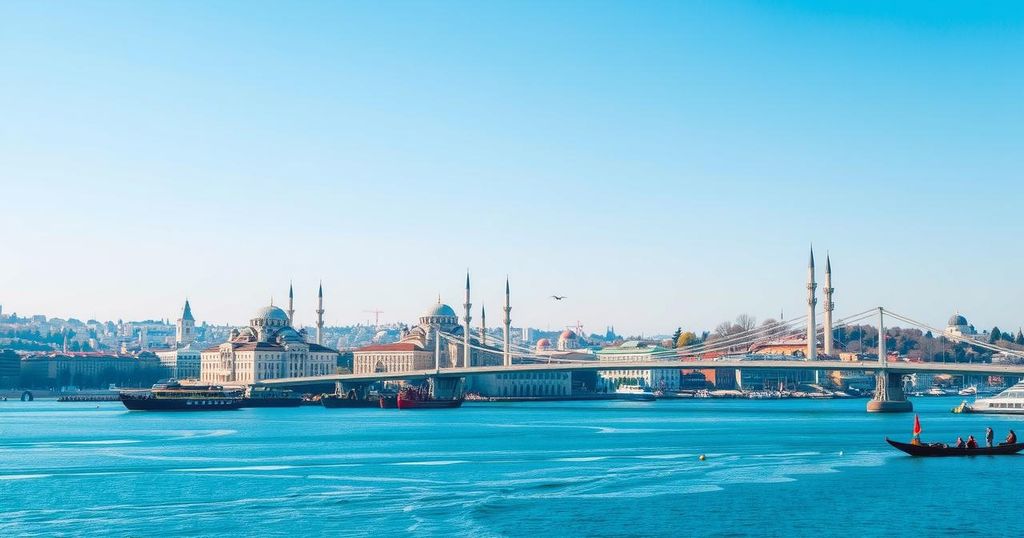World news
AP, ASIA, DONALD TUSK, ESTONIA, EUROPE, EUROPE/ASIA, EUROPEAN UNION, FRIEDRICH MERZ, INTERNATIONAL RELATIONS, ISTANBUL, KREMLIN, KYIV, MOSCOW, NORTH AMERICA, PEACE NEGOTIATIONS, PUTIN, RIYADH, RUSSIA, RUSSIA-UKRAINE WAR, SAUDI ARABIA, TALLINN, TURKEY, U. K, U. S, UKRAINE, UNITED STATES, US PRESIDENTIAL RACE, VLADIMIR PUTIN, WAR, WASHINGTON
Ethan Kim
0 Comments
Insights on the Upcoming Russia-Ukraine Peace Talks in Turkey
Potential peace talks regarding the Russia-Ukraine conflict may take place in Istanbul, with Putin inviting Zelenskyy for direct discussions. The Ukrainian president asserts he will only meet with Putin, amplifying pressure for direct engagement. Histories of prior negotiations failing adds complexity, while military maneuvers continue amid the ongoing war. Key demands from both sides remain unresolved, complicating prospects for effective dialogue.
TALLINN, Estonia (AP) — Potential peace talks regarding the ongoing conflict in Ukraine have shifted focus to Turkey, specifically Istanbul, as leaders seek a solution to Russia’s invasion, now entering its fourth year. Russian President Vladimir Putin has extended an invitation for direct discussions, while Ukrainian President Volodymyr Zelenskyy has publicly challenged Putin to meet face-to-face in the Turkish city that connects Europe and Asia.
Despite the anticipation of these talks, significant uncertainty looms over who will attend and the likelihood of any genuine negotiation. The Kremlin has not confirmed if President Putin will join the discussions, leading to speculation about the Russian representation. Mykhailo Podolyak, an adviser to President Zelenskyy, emphasized that the Ukrainian leader is only willing to meet with Putin directly, posing a condition for effective talks.
Recent developments leading up to these proposed talks include Zelenskyy gathering leaders from France, the UK, Germany, and Poland who all called for a 30-day ceasefire in Ukraine. This plan garnered support from notable figures, including European Union representatives and U.S. President Donald Trump. However, Putin responded swiftly, indicating his preference for holding talks without preconditions in Istanbul, not addressing whether he would meet with Zelenskyy directly.
The Ukrainian President countered that he would indeed travel to Turkey, insisting on a ceasefire while issuing a challenge to Putin to attend. Zelenskyy stated, “I will be waiting for Putin in Turkey on Thursday. Personally. I hope that this time the Russians will not look for excuses,” highlighting the crucial expectation that Putin participates.
The outcome of prior Istanbul discussions from 2022, which fell apart amid accusations from both sides of bad faith, casts a shadow over the ongoing negotiations. At that time, Zelenskyy categorized Russia’s demands as an ultimatum rather than a foundation for meaningful dialogue, saying, “There were never any negotiations; it was an ultimatum from a murderer.” Meanwhile, Putin claimed that Ukraine had derailed a deal that could have secured a pathway to peace.
As for conditions to bring the conflict to a close, Putin has made demands that include the cession of four regions, acknowledgment of Crimea as part of Russia, and a halt to Ukraine’s NATO ambitions, as well as the lifting of Western sanctions. Conversely, Ukraine remains steadfast on not surrendering territory and seeks strong security assurances against future aggression.
On the battlefield, both sides are gearing up for a significant increase in military activity. The conflict has seen tremendous casualties as Russian forces are reportedly bolstering their ranks to maintain operational momentum. The Institute for the Study of War suggests that Russian troops are slowly making headway in strategic locations along a nearly 1,000-kilometer front.
Despite ongoing military efforts, both Ukraine and Russia have engaged in short-lived ceasefires, with mutual accusations of breaches. Most notably, a recently brokered pause to attacks on energy infrastructure was marked by violations from both sides. The question remains whether the anticipated Istanbul talks can pave a path toward de-escalation or if they will follow in the footsteps of prior discussions that rapidly dissolved into further hostilities.
In summary, as anticipation builds around potential peace talks in Turkey, significant uncertainties cloud the discussions. With both Putin and Zelenskyy setting stringent conditions for their meetings, the possibility of constructive dialogue hangs in the balance. The backdrop of military preparations and strained past negotiations adds to the complexity, casting doubt over whether Istanbul could truly herald a new chapter in the ongoing conflict. Ultimately, the outcomes may hinge not only on diplomatic engagements but also on the evolving situation on the battlefield.
Original Source: www.citizentribune.com




Post Comment